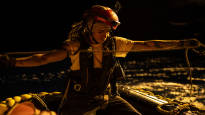We followed the rescuers’ work in the pitch-black sea in October. The largest number of people coming across the Mediterranean to Europe since 2016.
Jenna Vehviläinen,
Giorgio Casa
Argentinian Juan Cruz Vazquez, 27, has been working in the Mediterranean as a lifeguard for six years. During this time, he has been involved in taking thousands of migrants and refugees who have been in distress at sea to safety.
At the same time, he has watched how the countries of southern Europe have tightened their immigration policies and made it more difficult for rescue at sea.
– Many things have changed during this time: politics, characteristics of migrant boats, places of departure and countries of departure. What hasn’t changed is that people are still fleeing and moving.
Vazquez works on the Geo Barents vessel of Doctors Without Borders. In October, we got on board the ship to follow rescue operations in the Mediterranean Sea, across which more and more migrants and refugees are trying to reach Europe.
This year, almost 240,000 people have already come across the sea, of which Italy has received about two out of three.
Aid organizations rescue a small part of all those trying to cross the Mediterranean – this year, about 8 percent. A large number of those who arrive come on their own by boat to the island of Lampedusa, for example, or are rescued by the coastal authorities.
In Italy, for example, politicians have still raised the bar on organizations and accused them of promoting human smuggling and illegal immigration.
Prime Minister of Italy by Giorgia Meloni during the government, the organizations have only been allowed to save one migrant boat at a time, even if there are others in distress at sea at the same time. If they do not comply with the regulations, they are threatened with fines and a ban.
The authorities decide where the rescued people should be taken. During Meloni’s government, aid organizations have been assigned more and more distant landing ports in Italy.
Our sea trip ended in Genoa, which was located 1160 kilometers from the rescue site, off Libya.
According to aid organizations, these regulations are in conflict with international maritime regulations. They determine for examplethat people in distress at sea should be helped and taken to a safe place.
“I can’t get too attached to people who need to be saved”
Conditions at sea are complex. Sometimes the waves hit at a height of up to four or five meters. Then, seasickness is often suffered not only by the rescuers, but also by those being rescued from the boats.
Migrant boats are often found at night, and then people have to be searched at sea in pitch darkness.
This happened, for example, in October, when we were at sea aboard the Geo Barents. We received the first coordinates of the rubber boat carrying 63 people from a small plane patrolling the Mediterranean Sea at eight in the evening.
At that time we were 30 nautical miles away from the place where the boat was last seen. When we arrived two hours later, it took another two hours to find the boat in pitch black sea.
The UN refugee agency estimates that since 2017, around 17,000 people have drowned trying to cross the sea to Europe.
Vazquez originally moved to Europe from Argentina as a migrant himself, looking for work. He thinks it’s unfair that different people have different rights to move and move.
– I was able to come to Europe by showing my passport and in safe conditions. People coming across the Mediterranean do not have the same right, and they go through a really dangerous journey, says Vazquez.
After a two-month work assignment, Vazquez says he is tired and longs to go back home to the Canary Islands to rest. However, the next assignment is already waiting around the corner: at the beginning of December, he will go up to Geo Barents again.
Vazquez is in contact with several people he rescued from the sea, but tries to limit contact to protect his own well-being.
– If I get too attached to them, I can become very sad. I focus on sea rescue because that is the way I can help.
A-studio: What does Europe do when the number of migrants increases in the Mediterranean? In an interview with Jyrki Hara, journalist Jenna Vehviläinen and executive director of Pakolaisavu Annu Lehtinen.
